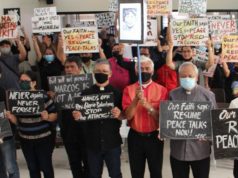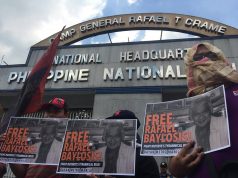The National Democratic Front of the Philippines’ Reciprocal Working Committee on Social and Economic Reforms (NDFP RWC SER) said at the weekend that rural-based sectors are looking forward to the resumption of the formal peace negotiations that will discuss and firm up unities on the Agrarian Reform and Rural Development agenda, and fast-track discussions on other pertinent sections of the proposed Comprehensive Agreement on Social and Economic Reforms (CASER).
“The people’s strong clamor for the continuation of the formal peace talks is enough conducive environment for the GPH and NDFP to return to the negotiating table and discuss thoroughly concrete and doable reforms,” said Randall “Ka Randy” Echanis, member of the NDFP Reciprocal Working Committee on Socio-Economic Reforms.
“Genuine development and industrialization of vast rural areas is possible if a genuine agrarian reform program, rural infrastructure and support services are in place, then farmers can unleash their full productive capabilities,” Echanis said.
“Farmers have the experience and capacity to develop the countryside and create rural industries that will benefit millions. Free land distribution is the necessary first step towards this goal.”
Echanis challenged the government to “walk the talk” on its declaration that free land distribution and support services to farmers are essential in achieving genuine agrarian reform. “If we are to discuss agrarian reform and rural development in upcoming meetings, the GPH should make concrete its recognition of free land distribution.”
The NFDP RWC-SER technical working group recently consulted farmers and peasant leaders nationwide regarding concrete proposals on rural development particularly in the enhancement of major crop lines and rural industries. The consultation was held in preparation for the forthcoming bilateral team meetings of the GPH and NDFP RWC-SER working groups to come up with a tentative CASER draft to accelerate the talks, with the target of completing the negotiations by the first quarter of 2018.
Gradual shift
During the consultation, farmers from the Ilocos region said they are willing to gradually shift from tobacco to other crops, particularly to food crops for domestic consumption like rice, corn, vegetables and others. “If there is irrigation in Ilocos, farmers can produce crops other than tobacco,” Echanis said.
Based on the NDFP draft, industries pertaining to coconut, sugar, abaca, bamboo and rattan, clothing and textile, pottery, furniture and the processing of meat, dairy, spices, fish, fruits, vegetable and other agricultural by-products should be further developed. “These industries are essential mainly to ensure food production for local consumption and develop an agri-based economy.”
“In our discussion with farmers, they reiterated that particular crop lines and rural-based industries can be developed depending on the actual local needs of the people and with the objective of establishing rural industries that will lay the ground for national industrialization. Raising agricultural productivity, and provision of agricultural research and development and support services to farmers were also proposed.
“Correct policy framework is significant in order to reinvigorate rural areas. The sooner we resume with the negotiations, the sooner we can address the needs of the people and the ailing local economy,” Echanis said.









